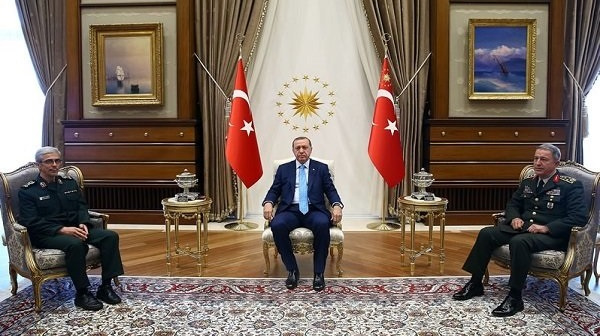Regional Developments Spark Diplomacy among the Iranian Military Leaders

Officials of Iran’s army and Revolutionary Guardian Corps have begun a busy autumn. A glance at the situation in the region illuminates the urgency of their many diplomatic meetings over the past months.
Turkish military Chief of General Staff Gen. Hulusi Akar had not left Iran when Major General Qasem Soleimani left for Moscow. Iranian Chief of Staff of Armed Forces Major General Mohammd Bagheri soon went on a four-day visit to Syria for talks with top military officials in Damascus. Significant on a different level was Iranian navy commander Rear Admiral Habibollah Sayyari’s visit to Italy, unprecedented for an army commander of the Islamic Republic since the Revolution.
The recent diplomatic visits of the chief of staff, defense minister, and the commander of the Quds force are about the evolving situation in the region, particularly in Iraq and Syria. The further escalation of the situation following the independence referendum held in the Iraqi Kurdistan is the main reason behind all the hustle and bustle.
Cessation of the Kurds from Iraq had no supporter except for Israel and all major players in the region adopted the same negative position. Analysts believe Iran has been trying to nip the plot in the bud. On the other hand, the fight against Daesh is yet to finish and influential Middle East states are still trying to restore peace and security.
Arab media outlets and analysts believe Major General Bagheri’s visit to Aleppo sends multiple messages because it is the first of its kind since the liberation of the city. Calling it proaction, rather than reaction to the recent Israeli air raids against the Syrian territory, they conclude that the visit was more than a formality of taking photos at the field or attracting public opinion.
Lebanese Al-binaa daily called the visit a pragmatic one for Syrian military leaders to meet their Iranian brothers who have fought hand in hand with them. “In fact, the visit indicates that military leaders of Iran and Syria are preparing a plan to continue strategic attacks against the collision forces. Cooperation with Iraqi armed forces is also in the same line, to secure a strategic route on land connecting Moscow and Gaza through Tehran, Baghdad, Damascus, and then Beirut,” the newspaper added.
Iranian analysts agree with the Arab media on that. It is all about the message of resistance in the fight against terrorism and efforts to restore stability in the region.
Esmaeil Kowsari, former commander in the IRGC and directed the Security Bureau of the General Staff of the Armed Forces, believes the recent visits to be in line with the realization of Iran’s regional objectives.
In an interview with Khabar Online, Kowsari said the main message of the recent series of talks is Iran’s continued presence in the region and its persistence to fight with terrorism and establish peace. “The main issue in the region is the fight with Daesh because the global arrogance, the Zionist regime [of Israel], and the enemies of the region wanted to seize control of the region by creating the terrorist group. The fight with Daesh is now in its final stages and will soon become operational as Major General Soleimani has promised,” he added. A second factor in analyzing the recent visits is the situation in the Iraqi Kurdistan, which you cannot see it solely from the Kurdistan region angle, Kowsari noted. “We have to see the consequences of the Kurdish independence in Kurd-majority regions of Iran, Syria, and Turkey,” he said, calling the cessation of Kurdistan the second plot engineered by the enemies of the region, which must be nipped in the bud. Iran needs more negotiations and visits at regional levels to counter the plot, he told Khabar Online.
He further said all the recent talks convey the message that Iran is not backing off and will defend the peace and stability of the region against every plot. “Iran has accepted to work with neighbors, including Turkey and Syria, in doing so. The cooperation could be strategic, like that of Iran and Russia, or based on temporary shared interests, like that of Iran and Turkey in Syria,” Kowsari explained. He conclude his remarks by saying the message has been delivered successfully, as Arab media outlets summarize it in three lines:
1. Iran and Syria fight together against their common Israeli and Takfiri enemies.
2. Iran will not allow Israel to assault Syria.
3. It is forbidden to allow repetition of Barzani’s mistake.

